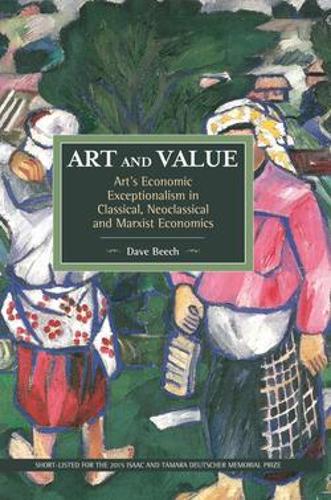
Art And Value: Art's Economic Exceptionalism In Classical, Neoclassical And Marxist Economics: Historical Materialism, Volume 94
(Paperback)
Publishing Details
Art And Value: Art's Economic Exceptionalism In Classical, Neoclassical And Marxist Economics: Historical Materialism, Volume 94
By (Author) Dave Beech
Haymarket Books
Haymarket Books
14th June 2016
United States
Classifications
Tertiary Education
Non Fiction
Far-left political ideologies and movements
701
Physical Properties
Paperback
392
Width 152mm, Height 229mm
546g
Description
Art and Value is the first comprehensive analysis of art's political economy throughout classical, neoclassical and Marxist economics. It provides a critical-historical survey of the theories of art's economic exceptionalism, of art as a merit good, and of the theories of art's commodification, the culture industry and real subsumption. Key debates on the economics of art are examined in detail. Subjecting mainstream and Marxist theories of art's economics to an exacting critique, Art and Value concludes with a new Marxist theory of art's economic exceptionalism.
Reviews
[Dave Beechs] book is well worth reading for anyone trying to grasp the strange place of art in our present social order, in which (even after the crash of 2008 revealed the reigning neoliberalism for the calamity it is) money is represented as the one unassailable truth.What in the world is art worth Its economic exceptionalism remains a conundrum, albeit one a reader of Art and Value can discern more clearly than before. Barry Schwabsky, Hyperallergic It is impossible in the hackwork of a review to do justice to both the nuanced and wide-ranging arguments set forth in Art and Value The consequences for rethinking arts relationship to capitalism (and its politics), as well the collision between the economic and non-economic more broadly, I think, are far-reaching. Art and Value is definitely exceptional. Alex Fletcher, Art Monthly "We're all looking for an opening. Dave Beech has put his hand on a key hidden for decades under a mountain of gloom. The result is Art and Value. I've never read anything like it In meticulous detail, Beech demonstrates how works of art are 'economically exceptional': that they are not in fact produced as commodities but only come into relation with the commodity form in ways that are not eternal, necessary, and incurable, but social, changeable, and even insignificant. It opens an authentically new dimension in this long debate and, in doing so, shows us a model of artistic, and by extension, social and political freedom that can inspire hope, confidence, and daring. This is a book of, and for, high spirits. Jeff Wall, artist. [E]schewing facile totalizations, [Beech] makes some much-needed theoretical distinctions rooted in Marxs work, and highlights anomalies and details. He is definitely asking the right questions. Andrew Kliman, an economist and Professor in economics at Pace University, New York.
[Dave Beechs] book is well worth reading for anyone trying to grasp the strange place of art in our present social order, in which (even after the crash of 2008 revealed the reigning neoliberalism for the calamity it is) money is represented as the one unassailable truth.What in the world is art worth Its economic exceptionalism remains a conundrum, albeit one a reader of Art and Value can discern more clearly than before. Barry Schwabsky, Hyperallergic It is impossible in the hackwork of a review to do justice to both the nuanced and wide-ranging arguments set forth in Art and Value The consequences for rethinking arts relationship to capitalism (and its politics), as well the collision between the economic and non-economic more broadly, I think, are far-reaching. Art and Value is definitely exceptional. Alex Fletcher, Art Monthly "We're all looking for an opening. Dave Beech has put his hand on a key hidden for decades under a mountain of gloom. The result is Art and Value. I've never read anything like it In meticulous detail, Beech demonstrates how works of art are 'economically exceptional': that they are not in fact produced as commodities but only come into relation with the commodity form in ways that are not eternal, necessary, and incurable, but social, changeable, and even insignificant. It opens an authentically new dimension in this long debate and, in doing so, shows us a model of artistic, and by extension, social and political freedom that can inspire hope, confidence, and daring. This is a book of, and for, high spirits. Jeff Wall, artist. [E]schewing facile totalizations, [Beech] makes some much-needed theoretical distinctions rooted in Marxs work, and highlights anomalies and details. He is definitely asking the right questions. Andrew Kliman, an economist and Professor in economics at Pace University, New York.
Author Bio
Dave Beech is an artist in the collective Freee and teaches Art at Valand Academy, Gothenburg University. His work has been exhibited at the Liverpool Biennial (2010) and the Istanbul Biennial (2013). He has co-authored The Philistine Controversy (Verso, 2002), edited Beauty (MIT/Whitechapel, 2009), contributed essays to Locating the Producers (Valiz, 2011), and Curating and the Educational Turn (Open Editions, 2010).
